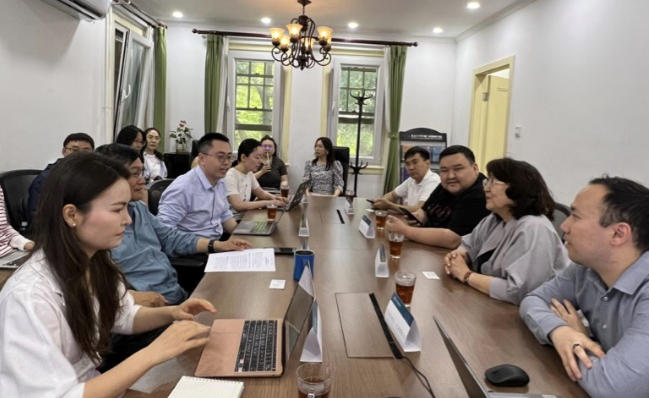
On May 21, 2024, the 25th lecture of the “Adventus Amicorum” seminar series was held at Peking University’s Institute of Area Studies (PKUIAS). During the seminar, Zhaksylyk Sabitov, executive director of the Research Institute for Jochi Ulus Studies, Kazakhstan; Maksat Zhabagin, chief expert of the Institute; Adilbek Karatayev, assistant research fellow; and Svetlana Kozhirova, director of the Chinese and Central Asia Studies Center of the International Academic Complex, Astana, gave presentations. Zan Tao, deputy director of PKUIAS and professor at the History Department, moderated the seminar, while Shi Yue, assistant professor at the School of Foreign Languages, PKU; Li Mingfei, associate research fellow at the Research Office of the History of Sino-Foreign Relations at the Institute of Ancient History, Chinese Academy of Social Sciences; and Enkar Boya, a postdoctoral fellow at the History Department, participated in the discussion.
Zan Tao welcomed Zhaksylyk Sabitov and his delegation. Sabitov introduced the main information about the Institute. Per Sabitove, the Research Institute for Jochi Ulus Studies, which was established in 2021, is mainly engaged in research on the history of Kazakhstan and the Golden Horde, and is currently planning to publish a seven-volume work on the history of Kazakhstan, one of which will focus on the Golden Horde history. The Institute is dedicated to the study of Kazakhstan’s history in an interdisciplinary manner. Sabitov pointed out that the Institute had established close cooperation with Russian academia, however, there was still a great potential for cooperation with Chinese scholars, and said he hoped to establish more cooperation with them in the future. Afterward, Maksat Zhabagin, a chief expert at the Institute, gave a presentation in which he talked about his exploration of the characteristics of the Y-chromosome haplogroups of the Kazakhs in Kazakhstan using a combination of molecular anthropology and history. Adilbek Karatayev briefly introduced his research and said he hoped to strengthen academic ties with PKUIAS in the future.
In the discussion session, Shi Yue discussed the relationship between tribal traditions and contemporary society in Kazakhstan. Li Mingfei introduced the current study of the Golden Horde and Jochi Ulus in Chinese academia and exchanged views with the Kazakh scholars on the status of Kazakhstan’s research in this field. Enkar introduced her study of Kazakh tribes based on historical archives in the Manchu language.


